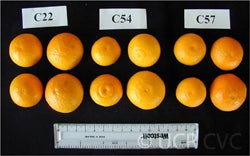X Citroncirus sp. RUTACEAE
CRC 4220
VI 793
Source
Received as budwood from CCPP via the UCR Breeding Program, 2009.
Parentage/origins
Citrus sunki and Swingle trifoliate orange
Rootstocks of accession
Carrizo citrange, C-35 citrange
Season of ripeness at Riverside
Unknown
Notes and observations
This is one of three rootstocks ('Bitters', 'Carpenter', and 'Furr') originally hybridized at the USDA US Date and Citrus Station in Indio, California, and developed further by the University of California, Riverside. This selection was named in honor of the late Dr Bill Bitters. According to the developer (see websites below), 'Bitters', "...produces a small tree, with high yield relative to canopy volume. Young trees on this rootstock showed good tolerance to freezing. Fruit quality of late navels was good and granulation was no worse than fruit on 'Carrizo' or 'C35'. It is tolerant to CTV, moderately tolerant to Phytophthora parasitica, not very tolerant of citrus nematode, and very tolerant of calcareous soil. 'Bitters' is considered promising as a replacement for sour orange rootstock for grapefruit in Texas." Additional information available on the developer's website includes a general summary and a trial summary. (RR Krueger, 07/15/2010)
According to the report provided by Claire Federici, Ricarda Kupper, and Mikeal Roose, “ ‘Bitters’, ‘Carpenter’ and ‘Furr’ trifoliate hybrids: Three New Citrus Rootstocks” Bitters C-22, Carpenter C-54, and Furr C-57 citrange rootstocks, all three are hybrids of Citrus sunki and Swingle trifoliate orange. John Carpenter and Joe Furr made all three hybrids as part of the USDA breeding program at Indio, CA. Professor W.P. Bitters tested the hybrids for Citrus Tristeza Virus tolerance in a trial established at the South Coast Research and Extension Center in Irvine, CA, in 1966 and 1968. All three hybrids showed good tolerance to the virus. Details about subsequent field trials, soils, management, and results compared to other varieties can be found at https://plantbiology.ucr.edu/faculty/ Summary-of-Active-Rootstock-Trials-5-09v5.pdf• ‘Bitters’ produces a small tree, with high yield per canopy volume. Young trees on this rootstock showed good tolerance to freezing. Fruit quality of late navels was good and granulation was no worse than fruit on ‘Carrizo’ or ‘C-35’. It is tolerant to CTV, moderately tolerant of Phytophthora parasitica, not very tolerant of citrus nematode, and very tolerant of calcareous soil. It was reported that this rootstock is the best candidate in Texas to replace sour orange due to its tolerance of calcareous soil conditions.
Availability
Commercially available in California through the Citrus Clonal Protection Program. Click here to order budwood.
USDA Germplasm Resources Information Network page for Bitters C-22 citrange
Bibliography
